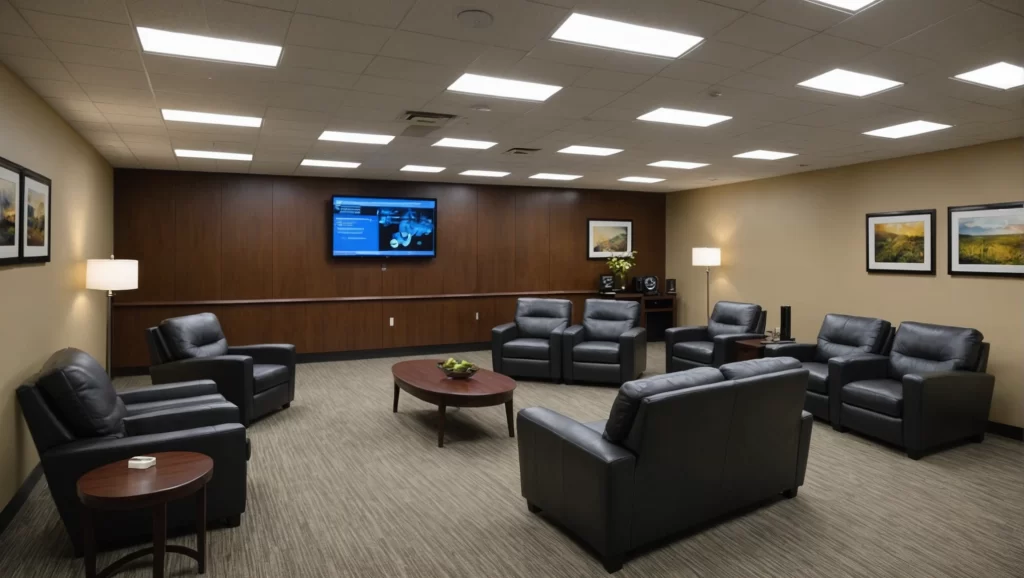Addiction Therapy Services?
“What if I never feel normal again?”
“How do I know if this is the right place for me?”
“What if I fail again? Can I even afford help?”
If you’re asking these questions, you’re not alone.
Addiction has a way of making you doubt everything.
But here’s the truth: you don’t have to stay stuck.
You don’t have to fight this battle on your own.
This blog isn’t a motivational speech—it’s a guide to Addiction Therapy Services that actually work.
Because if you’re here, you’re looking for real solutions.
Let’s break it all down, one step at a time.
What Are Addiction Therapy Services? (And Why Should You Care?)
Addiction Therapy Services are the tools, strategies, and support systems that help you break free from addiction.
They’re not one-size-fits-all.
They’re customized to YOU:
- Your triggers
- Your struggles
- Your goals
Here’s what they include:
- Therapy (group and individual)
- Medical detox (especially for people dealing with alcohol or opioids)
- Medication-assisted treatment (like Vivitrol clinics near me)
- Long-term support for mental health and relapse prevention
This isn’t just about quitting for a week or two.
It’s about rewiring your life so addiction no longer controls you.
How Do You Know It’s Time to Get Help?
Not sure if you need professional help?
Here’s a quick checklist:
- You’ve tried to quit but can’t stick with it.
- Your relationships are falling apart.
- You’re using more just to feel the same effect.
- Your health is going downhill fast.
- You’re hiding your use from people.
Sound familiar?
If you’re nodding, it’s time to find addiction therapy Services near me.
Breaking Down the Types of Addiction Therapy Services
Not all programs are created equal.
Let’s go over what works and why.
1. Medical Detox
Quitting cold turkey?
Not always a good idea—especially with alcohol, opioids, or benzos.
Withdrawal can cause serious issues, like:
- Delirium tremens (DTs): Dangerous seizures caused by alcohol withdrawal.
- Anxiety, sweating, and shaking.
- Even heart failure.
The best way to detox from alcohol is under medical supervision, like at a detox alcohol near me facility.
2. Inpatient Rehab
In patient rehab is for those who need full-time support.
It’s like hitting the “pause” button on life so you can focus 100% on recovery.
You’ll get:
- Structured schedules
- Group therapy (connecting with a group of alcoholics)
- Medication support
Programs like residential rehab also give you the space to reset your mind and body.
3. Outpatient Rehab
Can’t drop everything to check into rehab?
Outpatient programs let you balance recovery with your daily responsibilities.
Think therapy sessions, check-ins, and even virtual options.
These are perfect for people who need flexibility but still want to work with the best rehab treatment centers.
4. Medication-Assisted Treatment (MAT)
Vivitrol clinics near me are changing the game.
Here’s how MAT works:
- Medications like Vivitrol reduce cravings.
- Therapy teaches you how to rebuild your life.
This combo boosts your chances of staying sober.
5. Therapy (The Core of It All)
Therapy isn’t just about talking.
It’s about learning how to live without substances.
Some powerful options include:
- Cognitive Behavioral Therapy (CBT): Teaches you to break negative thought patterns.
- Family Therapy: Especially helpful if you’re dating an alcoholic or trying to rebuild trust.
- Holistic Treatment Near Me: Yoga, mindfulness, and nutrition that heals the whole person.
The Role of Mental Health in Recovery
Here’s a truth bomb:
You can’t separate addiction from mental health.
Anxiety, depression, and trauma often fuel addiction.
That’s why finding mental health services near me is a critical part of recovery.
What Mental Health Services Look Like
- Therapy Sessions: Work with a mental health therapist near me to process past pain.
- Inpatient Treatment Centers: For severe cases, mental health hospitals near me provide around-the-clock care.
- Medication: Sometimes you need help balancing your brain chemistry.

Overcoming Addiction Step-by-Step
No fluff here.
If you want to break free, follow these steps.
Step 1: Decide You Want to Change
Nobody can force you.
You’ve got to WANT it.
Step 2: Get Professional Help
Google addiction recovery near me or call 614-618-5000.
The right team can make all the difference.
Step 3: Start Small, Stay Consistent
Recovery isn’t about perfection.
It’s about showing up every day, even when it’s hard.
Why Addiction Therapy Services Matter More Than Ever
Addiction isn’t just a “bad habit.”
It’s a complex disease that rewires your brain.
Here’s why Addiction Therapy Services are critical:
- They treat the root cause, not just the symptoms.
- They rebuild your mental and physical health.
- They provide tools to prevent relapse.
And here’s the kicker:
Without professional help, quitting on your own can lead to dangerous complications like delirium tremens or permanent organ damage.
Inside the Science of Addiction
Why is it so hard to quit?
It all comes down to how substances hijack your brain.
1. The Dopamine Trap
Drugs and alcohol flood your brain with dopamine.
This makes you feel great—at first.
But over time, your brain stops producing dopamine naturally.
Now, you need the substance just to feel normal.
2. Physical Dependence
Withdrawal symptoms like dts alcohol withdrawal and cravings aren’t just in your head—they’re your body screaming for relief.
3. Mental Health Struggles
Many people turn to substances to cope with anxiety, trauma, or depression.
That’s why mental health services near me are a must for recovery.
The Road to Recovery: A Step-by-Step Breakdown
You’re not here to read fluff.
You’re here for a roadmap.
Step 1: Acknowledge the Problem
Denial keeps you stuck.
Admitting you need help is the hardest—and most important—step.
Step 2: Choose the Right Program
Search for addiction therapy Services near me or detox alcohol near me to find local options.
Look for programs that offer:
- Drug and alcohol rehab facilities
- Therapy for mental health and trauma
- Medication-assisted treatment like vivitrol clinics near me
Step 3: Build Your Support System
Whether it’s a group of alcoholics, family, or friends, you need people in your corner.
Check out support groups for families of addicts or refuge recovery meetings for additional help.
Step 4: Commit to Long-Term Recovery
Recovery isn’t a 30-day fix.
It’s a lifelong process.
That’s why programs like long term rehab and inpatient treatment centers are so effective.
How to Choose the Right Addiction Therapy Services
Not all rehab programs are created equal.
Here’s how to find the best fit:
1. Look for Comprehensive Care
The best programs address both addiction and mental health.
Search for mental health clinics near me and make sure they offer dual-diagnosis treatment.
2. Ask About Aftercare
Recovery doesn’t stop after rehab.
Ask if they provide:
- Follow-up therapy
- Sober living support (how much is insurance for a sober house?)
- Medication like goodrx gabapentin to manage symptoms
3. Check Their Success Rate
The best rehab treatment centers have a proven track record.
Don’t be afraid to ask tough questions.
Addressing Unique Challenges in Recovery
Dealing with Triggers
Triggers are everywhere—your favorite bar, an old friend, even stress.
Here’s how to handle them:
- Avoid high-risk situations.
Stay away from people and places that encourage use. - Practice mindfulness.
Techniques like meditation help you stay grounded. - Lean on support groups.
Programs like narcotics anonymous twelve traditions offer practical tools.
Dating an Alcoholic or Addict
Relationships during recovery are tricky.
If you’re dating someone in recovery, keep this in mind:
- Set boundaries.
- Be patient. Recovery takes time.
- Educate yourself. Learn about addiction so you can offer real support.
Common Myths About Addiction Therapy Services
Myth 1: “I Can Quit on My Own”
Sure, some people can quit cold turkey.
But for most, it’s not safe—or sustainable.
Myth 2: “Rehab Is Too Expensive”
Options like medical mutual of Ohio customer service can help cover costs.
Myth 3: “Rehab Doesn’t Work”
With the right program, rehab works.
The key is committing to the process.
The Role of Medication in Recovery
Medications can be a game-changer in managing cravings and withdrawal.
Popular Options Include:
- Vivitrol: Blocks the high from alcohol and opioids.
- Gabapentin: Manages anxiety and withdrawal symptoms (is gabapentin a n opioid? No, but it’s effective).
- Lorazepam: Often used during detox but can cause dependency (lorazepam side effects withdrawal).
FAQs About Addiction Therapy Services
What Are the Long-Term Effects of Alcohol?
Chronic drinking can lead to liver damage, heart problems, and mental health issues.
That’s why the best way to detox from alcohol is with professional help.
What’s the Difference Between Rehab and Detox?
Detox gets the substance out of your system.
Rehab teaches you how to live without it.
What Are the Signs of Opiate Addiction?
- Cravings
- Withdrawal symptoms
- Risky behavior (speed balling)
What Sets Ridgeline Recovery Apart?
At Ridgeline Recovery LLC, we don’t just treat addiction—we treat the whole person.
Here’s what makes us different:
- Access to the best rehab treatment centers in Ohio.
- Custom plans that include therapy, medication, and aftercare.
- Convenient location: 491 Georgesville Rd, Columbus, OH.
We’re here for you, every step of the way.
Unpacking the Importance of Addiction Therapy Services

Many people ask: Why do I need therapy? Can’t I just detox and move on?
Here’s the reality: Detox removes substances from your body, but therapy addresses the deeper issues that led to addiction in the first place.
Key Benefits of Addiction Therapy Services
- Identifying Root Causes
Addiction often stems from trauma, mental health disorders, or environmental factors. Therapy uncovers and addresses these triggers. - Building Coping Mechanisms
Life doesn’t stop being stressful after recovery. Therapy equips you with tools to handle challenges without turning to substances. - Preventing Relapse
Through relapse prevention plans and ongoing support, therapy reduces the likelihood of falling back into old patterns.
The Role of Holistic Treatment in Recovery
When searching for holistic treatment near me, you’ll find programs that focus on healing the mind, body, and spirit.
Holistic approaches include:
- Yoga and meditation
- Nutritional therapy
- Art and music therapy
These methods complement traditional treatments, offering a well-rounded recovery experience.
Breaking Down the Costs of Recovery
One of the biggest concerns people have is affordability.
Here’s the good news: Many programs are accessible, especially with options like medical mutual of Ohio customer service or state-funded initiatives.
Understanding Rehab Costs
- Inpatient Treatment Centers: These offer 24/7 care but can be pricier.
- Outpatient Programs: More affordable and flexible for those with responsibilities.
- Sober Living Homes: Ask, “How much is insurance for a sober house?” Some plans cover these transitional living spaces.
Addressing Unique Substance-Related Challenges
1. Alcohol Addiction
Alcohol remains one of the most commonly abused substances.
Key Concerns
- Delirium Tremens Treatments: DTs can cause seizures, confusion, and even death without proper care.
- Quitting Drinking Cold Turkey: Always consult a professional to avoid severe withdrawal symptoms.
- Long Time Effects of Alcohol: Chronic drinking impacts the liver, brain, and heart.
Solutions
Search for detox alcohol near me to find medical detox facilities. Consider rehab alcohol inpatient programs for structured care.
2. Opiate Addiction
Opiates like heroin and prescription painkillers present unique challenges.
Warning Signs
- Increased tolerance
- Symptoms of withdrawal (signs of opiate addiction)
- Dangerous behaviors like speed balling
Treatment Options
- Medication-Assisted Treatment (MAT): Using drugs like Suboxone or goodrx gabapentin to manage cravings.
- In Patient Rehab: Safe spaces for detox and recovery.
3. Emerging Threats: Xylazine
The effects of xylazine (a veterinary sedative) are now infiltrating the drug supply.
This dangerous trend highlights the need for vigilance and advanced treatment options at drug treatment rehabs.
The Emotional Impact of Addiction on Loved Ones
Addiction doesn’t just hurt the individual—it affects everyone around them.
Dating an Alcoholic
Dating someone struggling with addiction can be emotionally draining.
Here’s how to cope:
- Set boundaries.
- Encourage them to seek help.
- Join support groups for families of addicts to share your experiences.
Supporting a Family Member in Recovery
Families can play a pivotal role by:
- Attending therapy sessions.
- Learning about the twelve step program or narcotics anonymous twelve traditions.
- Prioritizing the importance of putting recovery first in returning to work.
Building a Strong Foundation in Recovery
Recovery isn’t just about quitting substances—it’s about rebuilding a meaningful life.
1. Education and Skill-Building
Learn life skills through programs that focus on how it works na (Narcotics Anonymous principles).
2. Finding Purpose
Programs like refuge recovery meetings emphasize mindfulness and purpose-driven living.
3. Creating a Safe Environment
Avoid triggers like robitussin and alcohol or places associated with your addiction.
A Closer Look at Long-Term Rehab
Short-term fixes don’t work for everyone.
For those with severe addictions, long term rehab offers:
- Extended support.
- Time to heal both physically and emotionally.
- A higher chance of sustained recovery.
Exploring Specialized Services
Every recovery journey is unique, and specialized services cater to individual needs.
Delirium Tremens Treatments
These are critical for those experiencing severe alcohol withdrawal.
Residential Rehab
Perfect for those needing a structured, distraction-free environment.
Holistic Treatment
If traditional methods haven’t worked, search for holistic treatment near me for alternative approaches.
Finding the Best Rehab Treatment Centers
The best rehab treatment centers aren’t necessarily the most expensive—they’re the ones that offer personalized care.
What to Look For
- Comprehensive services, including drug rehab facilities and therapy.
- Affordable options like rehab cost calculators or insurance.
- A proven track record of success.
FAQs About Addiction Therapy Services
What’s the Cost of Rehab?
Rehab cost varies.
Check with your insurance provider or look for options like Medical Mutual of Ohio customer service.
Can I Quit Drinking Cold Turkey?
Not if you want to stay safe.
Always detox under medical supervision.
What’s the Success Rate?
It depends on the program and your commitment.
The best programs combine therapy, medication, and aftercare.
What’s the Generic Name for Dilaudid?
Dilaudid’s generic name is hydromorphone.
Is Gabapentin an Opioid?
No, but it’s often used in addiction therapy Services to manage symptoms like anxiety.
Can You Detox at Home?
While possible, it’s not recommended. Always seek professional help from a drug treatment rehabilitation center.

Ridgeline Recovery: Your Partner in Healing
At Ridgeline Recovery, we understand that every journey is unique.
Our services include:
- Drug and alcohol rehab facilities tailored to your needs.
- Access to rehabs for alcoholism with a compassionate team.
- Innovative programs that incorporate holistic treatments.
Take the first step toward a brighter future. Call us at 614-618-5000 or visit www.ridgelinerecovery.com.
Your recovery begins here.
Call Us Now!
If you or a loved one is struggling with heroin or alcohol dependency, reach out to Ridgeline Recovery Center in Columbus, Ohio, today. At Ridgeline Recovery, we offer a path to hope and healing. Our comprehensive Addiction Recovery services include Addiction Therapy, Addiction Treatment, Vivitrol Clinic and specialized Mental Health Services designed to support your journey to recovery.
We provide Aftercare Programs and Peer Support to ensure you have ongoing assistance after treatment. Our dedicated team offers Case Management and Child Services for those needing extra support. For individuals who prefer a faith-based approach, we offer Faith-Based Recovery options.
Our programs feature Group and Individual Counseling, along with Medication-Assisted Treatment (MAT) to address your unique needs. We also have an Intensive Outpatient Program (IOP) and a Partial Hospitalization Program (PHP) for more structured care.
Our team includes Registered Nurse Services, Psychiatric Services, and Therapeutic Behavioral Services (TBS) to provide comprehensive support throughout your recovery process. We work with various Insurance Coverage plans to help you access the care you need.
Don’t wait—contact us now to start your journey toward a brighter future with Ridgeline Recovery.
For more stories and information Contact Us, visit our Blog page and Stories & Highlights.



